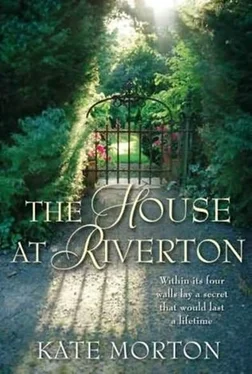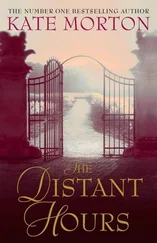And they were. Just how important, we could never have imagined.
‘New money,’ Mrs Townsend said knowingly, looking from Myra to Mr Hamilton to me. She was leaning against the pine table using her marble rolling pin to quash resistance from a knot of sweaty dough. She stopped and wiped her forehead, leaving a trail of flour clinging to her eyebrows. ‘Americans at that,’ she said, to no one in particular.
‘Now, Mrs Townsend,’ Mr Hamilton said, scrutinising the silver salt and pepper dishes for tarnish. ‘While it’s true Mrs Luxton is one of the New York Stevensons, I think you’ll find Mr Luxton is as English as you or I. He hails from the north according to The Times .’ Mr Hamilton peered over his half-rimmed glasses. ‘A self-made man, you know.’
Mrs Townsend snorted. ‘Self-made man indeed. Can’t have hurt marrying her family’s fortune.’
‘Mr Luxton may have married a wealthy family,’ Mr Hamilton said primly, ‘but he’s certainly done his bit to increase the fortune. He’s a very successful businessman by anyone’s standards. Textiles, manufacturing, pharmaceuticals. There’s not much he doesn’t have a hand in running. Especially since the war.’
Mrs Townsend humphed. ‘I don’t care if he owns half of England. It don’t change the fact he’s new money.’ She pointed her rolling pin at each of us in turn. ‘New money on the lookout for old class.’
‘At least they have money,’ Myra said. ‘That’ll make a welcome change around here if you ask me.’
Mr Hamilton straightened and shot me a stern look, though I had not been the one to speak. As the war had progressed and Myra had spent more time working on the outside, she had changed. In her duties she remained efficient as ever, but when we sat around the servants’ table and spoke of the world, she was more comfortable in voicing opposition, more likely to question the way things were done. I, on the other hand, had not yet been corrupted by external forces and, like a shepherd who decides ’tis better to forsake one lost sheep than risk the flock through inattention, Mr Hamilton had determined to keep both eyes on me. ‘I’m surprised at you, Myra,’ he said, looking at me. ‘You know the Master’s business affairs are not ours to query.’
‘I’m sorry, Mr Hamilton,’ Myra said, in a voice without contrition. ‘All I know is that ever since Mr Frederick came to Riverton, he’s been closing rooms faster than I can say. Not to mention the furniture that’s been sold from the west wing. The mahogany writing bureau, Lady Ashbury’s Danish four-poster.’ She eyed me over her polishing cloth. ‘Dudley says most of the horses are going too.’
‘His Lordship is simply being prudent,’ Mr Hamilton said, turning to Myra to better argue his case. ‘The west rooms were closed because, with your railway work and Alfred being away, there was far too much cleaning for young Grace to manage on her own. As for the stables, what need does His Lordship have for so many horses with all his fine motor cars?’
The question, once launched, he let linger in the cool winter’s air. He removed his glasses, huffed on their lenses and wiped them clean with a triumphant theatricality.
‘If you must know,’ he said, stage business complete, glasses restored to his nose’s end, ‘the stables are to be converted into a brand-new garage. The largest in all of Essex.’
Myra was nonplussed. ‘All the same,’ she said, lowering her voice, ‘I’ve heard whispers in the village-’
‘Nonsense,’ Mr Hamilton said.
‘What kind of whispers?’ Mrs Townsend said, bosom heaving with each roll of her pin. ‘News about the Master’s business?’
At the stairs, the shadows shifted and a slim woman of middle years stepped into the light.
‘Miss Starling…’ Mr Hamilton faltered. ‘I didn’t see you there. Come on in and Grace will make you a cup of tea.’ He turned to me, mouth tight as the top of a coin purse. ‘Go on then, Grace,’ he said, motioning toward the stove. ‘A cup of tea for Miss Starling.’
Miss Starling cleared her throat before stepping away from the stairwell. She tiptoed toward the nearest chair, little typewriting machine clamped beneath a freckled arm.
Lucy Starling was Mr Frederick’s secretary, employed, originally, for the factory in Ipswich. When the war ended and the family moved permanently to Riverton, she started coming from the village, twice a week, to work in Mr Frederick’s study. She was perfectly ordinary to look at. Medium brown hair tucked beneath a prudent straw hat, skirts in dull shades of brown and olive, a plain white blouse. Her only accessory, a small cream cameo at her collar, seemed to sense its own ordinariness, wilting sadly forward to reveal its simple silver clasp.
She had lost her fiancé on the Ypres Salient and wore her mourning, like her clothing, with enduring plainness, her grief too reasonable ever to excite great sympathy. Myra, who knew such things, said it was a great shame she had gone and lost a man prepared to marry her, for lightning did not strike twice and with her looks and at her age she would almost certainly end up an old maid. What’s more, Myra added sagely, we were as well to pay particular attention that nothing go missing from upstairs, as Miss Starling was as likely as not to be looking toward her old age.
Myra’s were not the only suspicions aroused by Miss Starling. The arrival of this quiet, unassuming and, by all accounts, conscientious woman, created a stir downstairs that now seems unimaginable.
It was her place that caused such uncertainty. It wasn’t right, Mrs Townsend said, for a young lady of the middle class to be taking liberties in the main house, seating herself in the Master’s study, gadding about with airs and graces out of step with her position. And, though it was doubtful that Miss Starling with her sensible mouse-brown hair, home-stitched clothing and cautious smile could ever be accused of airs and graces, I understood Mrs Townsend’s bother. The lines between upstairs and down had once been clearly and comfortably drawn, but with Miss Starling’s arrival old certainties had begun to shift.
For while she was not one of Them, neither was she one of Us.
Her presence downstairs that afternoon brought a cerise glow to Mr Hamilton’s cheeks and a nervous animation to his fingertips, which now hovered busily about his lapel. The curious matter of station perplexed Mr Hamilton specially, for in the poor, unsuspecting typist he perceived an adversary. Though as butler he was the senior servant, responsible for overseeing the house’s management, as personal secretary she was privy to the shimmering secrets of the family’s business affairs.
Mr Hamilton plucked his gold fob watch from his pocket and made a show of comparing its time with that on the wall clock. The watch had been a gift from the former Lord Ashbury and of it Mr Hamilton was immeasurably proud. It never failed to deliver him stillness, to help retain authority in instances of stress or bother. He ran a pale, steady thumb across its face. ‘Where is Alfred?’ he said, finally.
‘Laying table, Mr Hamilton,’ I said, relieved that the taut balloon of silence had finally been pricked.
‘Still?’ Mr Hamilton snapped closed the watch, his agitation finding welcome focus. ‘It’s been almost a quarter-hour since I sent him with the brandy balloons. Honestly. That boy. I’d like to know what they’ve been teaching him in the military. Ever since he got back he’s been flighty as a feather.’
I flinched as if the criticism had been levelled at me.
‘It’s common with them that’s come home,’ Myra said. ‘Some of them that arrive at the train station are quite strange-’ She stopped polishing wine glasses as she fished about for the right words. ‘Nervous and a bit jumpy.’
Читать дальше












